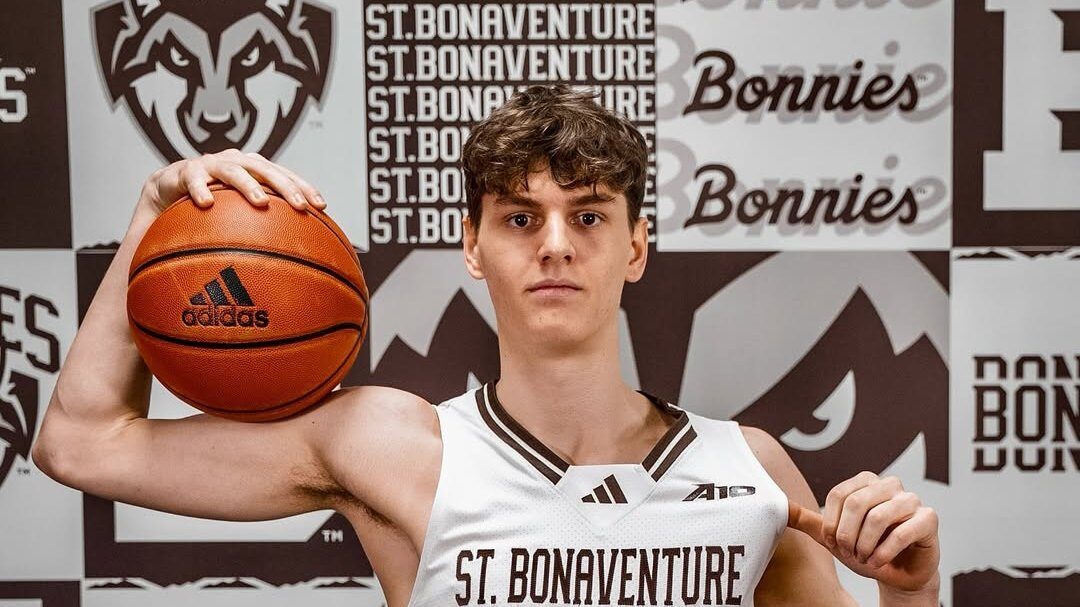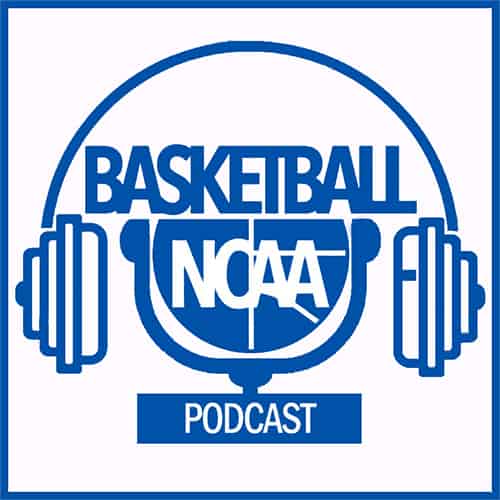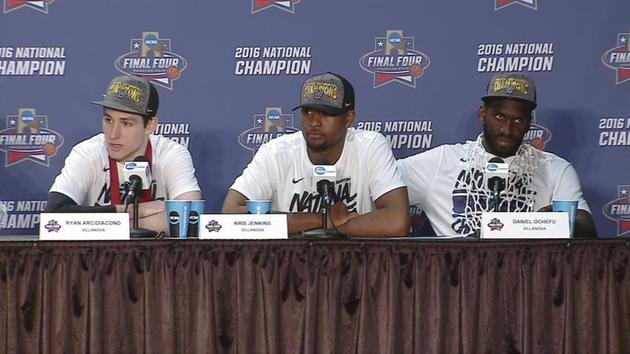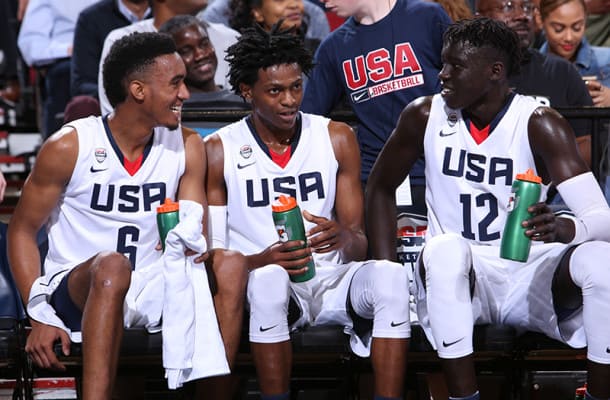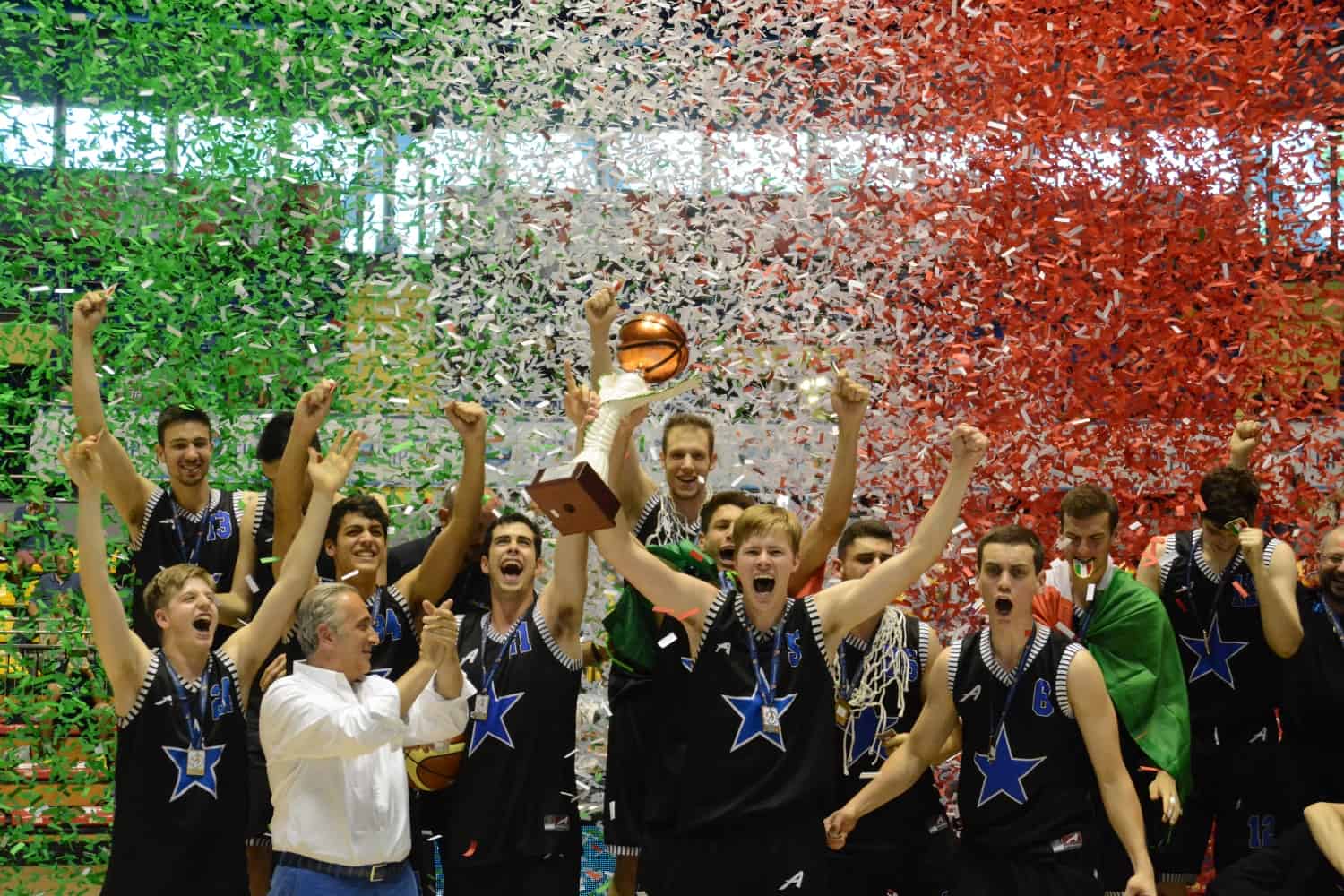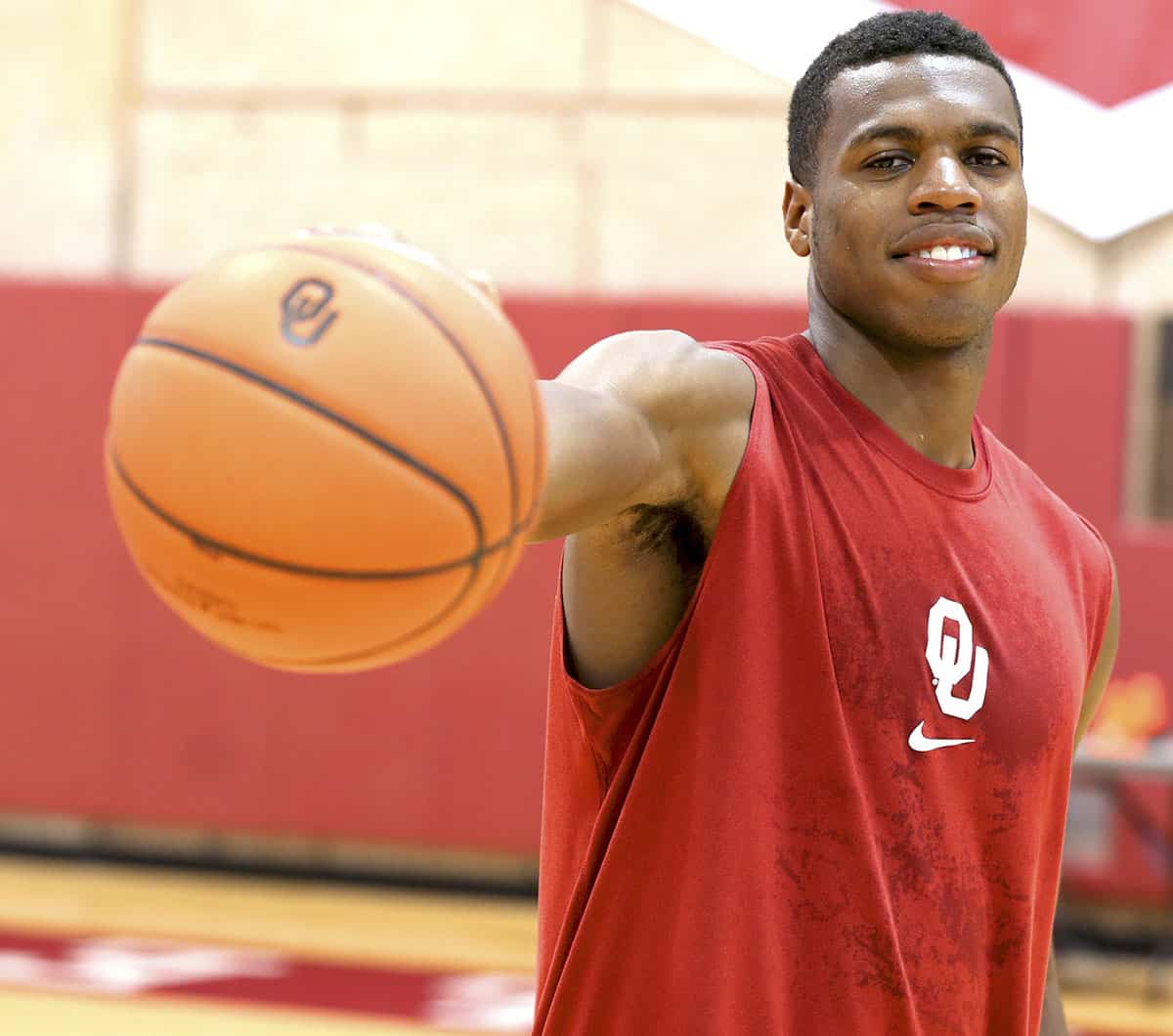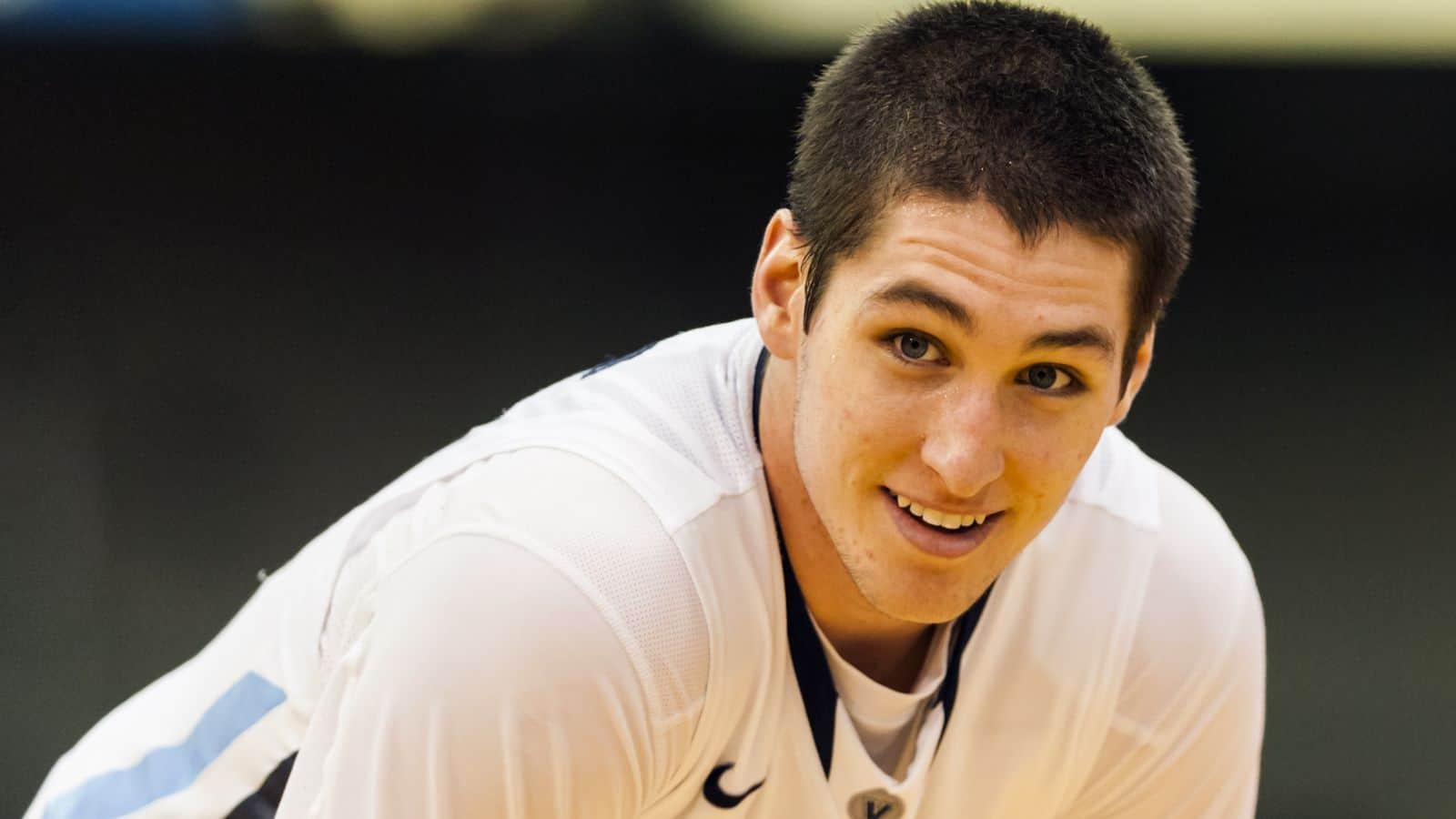There’s regular recruiting, and then there’s Achille Lonati’s recruiting. The general manager who contacted and convinced the guard of Olimpia Milano to cross the ocean to St. Bonaventure University is no ordinary figure. Adrian Wojnarowski is a well-known name in the United States and beyond, having been ESPN’s leading NBA insider for many years. However, last year he left his journalism career and returned to his alma mater to bring the men’s basketball team back to prominence. To do this, he also chose Lonati, who, after reaching the NextGen final, is ready to begin his NCAA journey. Alongside Dame Sarr and Maikcol Perez, he is part of a group of young Italians from the remarkable 2006-2007 class who decided to accept offers from American colleges—to play, to earn, but also to study.
Born in Magenta and raised in Gropello Cairoli, in the province of Pavia, Lonati is a 192 cm guard with a shot that has been key to the success of Milan’s youth teams and the national team. Here’s what he told us the day before leaving for Abu Dhabi, where he was the tournament’s top scorer and was named to the all-tournament first team alongside his good friend Luigi Suigo.
With the NextGen Final Eight, you’re concluding your experience with Olimpia after 10 years and many trophies. How was your journey?
My relationship with Milan started in a rather unusual way. I was very young and played a friendly match against Olimpia while on loan at Vigevano; I was about 8 or 9 years old, maybe even younger. They noticed me and started calling me, but I didn’t want to go—partly because I had beaten them and felt stronger than them, and partly because I was shy and not very open to new experiences. But they kept calling me, and I played tournaments on loan with them for a couple of years before they convinced me to join. It was the best choice I could have made. I’ve spent more than half my life there, in a wonderful environment, like a family, with an amazing group that maintained a really high level from the youngest teams up to the under-19s. There was already something special in the air, and indeed, we became a special group.
There’s also a strong national team presence in your youth career, and last summer you got a taste of American basketball with the Under-17 World Final against Team USA. Tell us how it went between AJ Dybantsa and the Boozer brothers.
We arrived in Turkey confident in our abilities, knowing we could compete with anyone and with a clear mind. Then we lost the first two group games, something sparked again against New Zealand, but in the round of 16 against Australia, we fell behind badly. I was playing terribly, really awful, but we didn’t get discouraged; we encouraged each other, switched to a zone defense with Suigo under the basket acting like an umbrella. We played a bit chaotic, and point by point we got close. Ceccato hit an incredible three-pointer, and then in overtime, it was all over. I finally got fired up too, and that game turned the World Cup around.
Personally, I didn’t expect the final to be one-sided or that we would be dominated like we were. I was fairly confident—not saying I was sure we’d win, but I thought we could definitely compete. Instead, their athleticism and physicality had an immediate devastating impact. We played better in half-court, but their full-court press was unbelievable: as soon as you had the ball, two-meter-tall guys would double-team you, jumping a meter and a half with their arms spread three meters wide. Even finding a tiny opening to make a pass was science fiction. It was incredible; you’re never used to facing a press like that. With a normal team, if you get doubled, you can usually find space to get the ball out. Against Team USA, you find it once, maybe, and then four times you don’t.
You were perfect from beyond the arc with 6/6 in the Istanbul final, and it was after that game that you began having serious contacts with the NCAA world. Besides St. Bonaventure, which other colleges showed interest in you, and how difficult was it to choose?
Yes, the contacts with colleges started after the World Cup. The first video call I had was with Texas Tech at the end of October or early November, and shortly after with Xavier, where everything then changed. Texas Tech seemed very interested and had asked me to visit, but there was uncertainty about what would happen with the coaching staff, so it didn’t make much sense to go. Then my agent told me that Woj had contacted him in late January or early February, expressing interest in me, and from the start, Woj was really on me. I had the first video call with the staff, then shortly after the second with the coach, which is a very important step in recruiting because having a call directly with the coach means there is strong interest.
Woj, meaning Adrian Wojnarowski. What was your relationship with him like, and how much did the interest from someone like him influence things?
It was actually Woj himself who contacted me, and that made a big difference because it’s quite something to go from reading his daily updates about the best players in the world to seeing him follow me on Instagram and message me on WhatsApp. And then the “Woj bomb” with my name was incredible. He’s an amazing person; he used to write to me almost every day, and we developed a great relationship. They wanted to see me right away and talked about the visit. Then Woj came to the NextGen event in Belgrade, stopped by Milan, and we had dinner together. After that, we tried to arrange the visit, which was supposed to happen just before the national finals in mid-April, with Woj and my agent coordinating everything—until suddenly, on Saturday night, my agent messaged me saying, “We’re leaving Tuesday.”
💣 🇮🇹
— Adrian Wojnarowski (@wojespn) April 16, 2025
It was late March, and you arrived for the first time at St. Bonaventure, a small Catholic college in the state of New York, nicknamed ‘The Bubble’ by its students because it’s in the middle of nowhere. The official visit lasts 48 hours on campus—what were your first impressions?
It was a wonderful experience. I got to know everything around the team, what the whole school was like, including the academic side, which is very important, and then we finalized the last details of the contract. It made a great impression on me—the campus is small, with about 2,500 students, located in the middle of a nature reserve surrounded by mountains and hills. It’s really in the middle of nowhere; there’s just a small town nearby, and Buffalo is more than an hour’s drive away, where the airport is. The atmosphere on campus is nice, very welcoming, with a very family-like vibe, and that was definitely a plus.
Tell us about Mark Schmidt, coach of the Bonnies for almost 20 years and one of the most respected in the mid-major world.
He’s really nice; he even drove me around to eat out, truly very friendly. He made a great impression on me. Just talking to him, you could tell he knew me well—he had actually seen me play. He talked to me about his style of play and how I would fit in, and that also seemed excellent to me
After a disappointing season, St. Bonaventure has been practically rebuilt. How do you see the team, and how do you envision your path in the NCAA over the next few years?
In recruiting, Woj focuses a lot on one thing: he says he can identify the people who are right for the Bonnies—those who have a genuine attachment to the place. He’s trying to build a team that doesn’t fall apart easily, unlike what we’ve seen in the transfer portal where some colleges ended up with no players at all. He puts a lot of emphasis on players who want to stay connected to that place. Of course, it’s hard to say what will happen in a year; we’ll see how the season goes. If I play amazingly well and get $50 million offers, it’s logical to move on, but I’m happy with the choice I made and wouldn’t mind staying there for four years. The team looks very good to me; I only followed the end of last season, but there have been some good additions: Big Joe the Red (Joe Grahovac, here’s his incredible story) seems like a really great player, as does Frank Mitchell (a junior transfer from Minnesota), another center, and then the guards, like the solid-level Russian point guard (Ilia Ermakov, also a 2007 freshman arriving from CSKA). I think we can aim to do better; the goal for everyone is to make it to March Madness, but right now it’s hard to have a clear overall picture. Still, I think I ended up in a good place and on a good team.
"Achille has shown a penchant for big-game performances in clutch moments with the Italian national teams and Olimpia Milano, but it is his consistency of work, preparation and poise that has us especially excited about his future."
🏀 Bonnies General Manager @wojespn pic.twitter.com/tZtWnb6rf1
— Bonnies Men's Basketball (@BonniesMBB) April 22, 2025
Let’s talk about NIL, because it’s obvious that the NCAA is now attractive also because of the money it offers: how much did it influence your recruiting?
I admit I don’t fully understand it either, especially with new rules like the salary cap that still need to come into effect. I’m completely unfamiliar with all that, but luckily I have people who handle it for me. Even during the negotiations with St. Bonaventure, I didn’t do anything myself; the agency took care of everything. The contract arrived, fully reviewed by lawyers, and I had it explained to me in simple terms before signing. It’s definitely a change that benefits the colleges: no one in Europe can offer the kind of money a college can, and it’s unthinkable for a young player to be paid millions of euros like happens in the NCAA. Unfortunately, that’s not my case (he smiles), I’m not earning millions yet, and for me it was also fundamental to continue my academic path. In Italy, it’s difficult to pursue university studies and graduate while playing basketball at a high level, so that was important to me, even more than NIL. I enrolled in economics, and having a scholarship from a college as reputable as St. Bonaventure means a lot.
Tell us something unique about your contract—does it, for example, require you to do three commercials for X chips?
In my NIL deal, there’s a really fun thing: in the small town next to the college, there’s an Italian restaurant called Angee’s. I’ll be collaborating with them, and on the menu, the lasagna will be renamed “Lonati Lasagna.”
“The warmth and passion from the fans made my decision an easy one. I can't wait to wear this jersey and give everything I have alongside my new teammates.”
🏀 Achille Lonati pic.twitter.com/Sti5eFQrat— Bonnies Men's Basketball (@BonniesMBB) April 22, 2025
Strengths and weaknesses of Achille Lonati before heading to the United States
I definitely don’t feel like I’m complete in any aspect of my game. Even in shooting, which is currently my strong point, I know there’s a lot to improve. I need to speed it up to be more effective in many situations, like coming off screens, to have higher percentages and more chances to create shots for myself. I definitely need to improve a lot on defense and work hard in the gym to build my physicality. Defense and physical strength are my two biggest weaknesses, but I’m confident I can work on them and I want to do it. I’m not in a hurry, and I’m also very happy to have evolved my game a bit, becoming more of a ball-handler to manage the team as a playmaker and not just as a guard, playing more pick and roll.
Let’s jump ahead: where will you play when you leave the NCAA?
I grew up watching the NBA and LeBron James, so eventually finding myself in the NBA would be incredible, and of course, it’s a goal. I know there’s a lot, a huge amount, an enormous amount of work to do; I’m not at that level right now, but we’ll see in the future. In terms of my personal style, I’m more of a EuroLeague player than an NBA player. It would be amazing to make it to the NBA, but even just playing in the EuroLeague would be a huge goal. I’m talking about it casually, but that would also be a dream—it would be great to return to play in the EuroLeague at home, meaning Olimpia Milano. I’ll miss it; it’s part of my routine. I’m at the Forum more than at school; I spend hours and hours there every day, and it will feel strange not to go anymore.
To conclude, what does your schedule look like now?
Now my season is finally over after the NextGen, and I say finally because it was really physically demanding: between Serie B and Under-19, we played over 100 games, and you definitely feel it. I have my high school final exams coming up, which I need to pass to move forward, and now I can focus on them properly. Then there’s getting my driver’s license—I’ve already got the learner’s permit—plus the national team with the European Championship in July. After that, I hope to take at least two weeks of vacation. And then I’m off.
